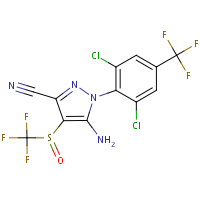Molecular formula for Fipronil:

The maximum allowable level of fipronil residue found in eggs is to be raised to 0.01 parts per million (ppm) starting tomorrow, the Food and Drug Administration (FDA) said yesterday.
The Ministry of Health and Welfare yesterday said it has amended Article 3 of the Standards for Pesticide Residue Limits in Foods and Article 3 of the Standards for Pesticide Residue Limits in Animal Products.
After a series of food scandals involving fipronil-tainted eggs last year, the Cabinet instructed the ministry and the Council of Agriculture to set a maximum residue limit for fipronil in eggs as soon as possible, so that egg farmers would have a standard to follow.
According to current regulations, no trace of fipronil should be found in eggs, meaning that any level of fipronil residue detected above 0.005ppm — the smallest concentration that can be reliably measured — is considered illegal.
This resulted in hundreds of thousands of fipronil-tainted eggs being destroyed last year.
The FDA said a council survey found that, as fipronil is allowed on grain crops, animal feed can sometimes contain residue, which results in it being found in eggs.
The ministry based the maximum allowable level on specialists’ suggestions and safety evaluations, it said, adding that residue levels above 0.01ppm could indicate that the insecticide was intentionally used by the egg farmer.
The amendments also include the cancellation of maximum allowable fipronil levels — meaning no trace should be found — for five types of fruit and vegetables: adzuki beans, tomatoes, cucumbers, mangoes and vegetables with tighter leaves, such as cabbage, lettuce, Chinese cabbage and iceberg lettuce, the ministry said.
People or companies that sell fruit, vegetables or eggs that contain fipronil residue levels exceeding the limit are to be fined between NT$60,000 and NT$200 million (US$1,968 and US$6.56 million), according to the Act Governing Food Safety and Sanitation.
*Original article online at http://www.taipeitimes.com/News/taiwan/archives/2018/06/28/2003695698
